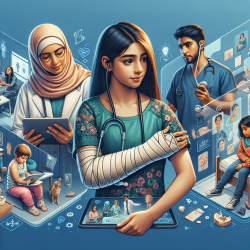Genetic Counseling: A Key to Unlocking Better Outcomes
As practitioners in the field of genetic counseling, it's imperative to stay informed about the latest research and models that can enhance service delivery and patient outcomes. A recent study titled "Evaluating a General Pediatric/Adult Genetic Counseling Clinic in a Midwest Medical Center" provides valuable insights into a successful model that could be replicated to improve genetic counseling services across various regions.
Understanding the GCC Model
The study focuses on a Genetic Counseling Clinic (GCC) established at the Munroe-Meyer Institute for Genetics & Rehabilitation at the University of Nebraska Medical Center. This clinic was designed to increase access to genetic services and reduce wait times for patients. By having genetic counselors lead patient encounters, with geneticists serving as advisors, the GCC effectively streamlined the counseling process.
Data from the study revealed that the average wait time between referral and appointment was reduced to 49.8 days. This is a significant improvement, considering the often lengthy wait times for genetic services. The primary reasons for patient visits included reviewing genetic test results, coordinating genetic testing for known familial variants, and addressing concerns about personal or family history suggestive of genetic conditions.
Key Recommendations for Practitioners
For practitioners looking to improve their genetic counseling services, the GCC model offers several key takeaways:
- Autonomous Counseling: Allow genetic counselors to lead patient interactions, which can enhance efficiency and patient satisfaction.
- Specialist Collaboration: Establish a network of specialists, such as endocrinologists, neurologists, and cardiologists, for follow-up care. This was a common recommendation in the GCC, ensuring comprehensive patient management.
- Streamlined Processes: Implement systems to reduce wait times and improve access to genetic counseling services, which can lead to better patient outcomes.
Encouraging Further Research
While the study provides a robust framework for implementing a GCC model, it also highlights the need for further research. Practitioners are encouraged to explore additional ways to optimize genetic counseling services, such as leveraging telehealth technologies and enhancing interdisciplinary collaboration.
For those interested in delving deeper into the findings and methodology of the study, the original research paper is available for review. Evaluating a General Pediatric/Adult Genetic Counseling Clinic in a Midwest Medical Center.










